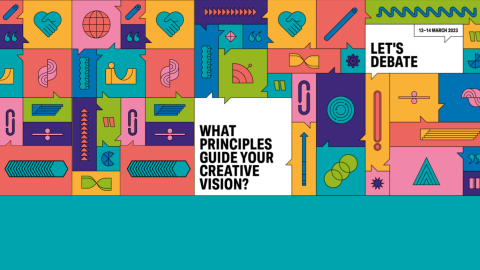
Zoe Rasbash Environmental Emergencies Action Researcher
on Tue 20 June 2023Let’s Debate: We need to move beyond a culture of shame around environmental action
Posted on Tue 20 June 2023
In March, the Let’s Debate conference brought together representatives and keynote speakers from across the nation's arts and culture sector to interrogate the Arts Council England's Investment Principles, celebrate the best and most innovative practice, and share barriers to action.
As Watershed’s Climate Action Researcher, I’ve been thinking deeply about the role of our sector in acting on Climate, and so was thrilled to be offered the opportunity by producers Mediale to co-curate activity around Environmental Responsibility. I was keen to share my thoughts on why we seem to be stuck on this topic and how we might move through this to see more radical action.
Conversations around Inclusivity & Relevance, Dynamism and Ambition & Quality felt nuanced, pioneering and progressive – with delegates confidently articulating how these principles inform each other, what they mean in different contexts and aspirations for deeper future work. As a host of one of the discussion tables who is new to the Arts Council IPs, I felt informed and inspired at the level of critique offered up by the room.
However, to me, participants’ conversations around Environmental Responsibility felt still in their infancy. Although all are keen to act, there was an atmosphere of overwhelm, and of not being quite sure what is expected of us – something I have felt more broadly in conversing with arts organisations and freelancers over the last two years in my own research. As the fantastic keynote speakers Sara Kassam - former Sustainability Lead at the V&A, and Caitlin Southwick, founder of Ki Culture - so brilliantly pointed out, this comes down to the fact that this stuff is hard and we need to be better resourced and better informed to understand more deeply what climate action looks like for our incredibly diverse sector collectively, and the individual nodes which make it up. As Caitlin and Sara emphasised, this work takes time to develop and implement and requires strategic prioritising, which can be hard to do when faced with such an urgent crisis.
This isn’t necessarily a bad thing: there is huge potential for the creative minds across the UK to really sink their teeth into this principle like they have others. If we energise a creative and considered approach, I think we could start to see real innovation, impact, and collective action.
There were several sticking points in discussions, which had my mind fizzing…
Climate literacy
The words ‘climate change’ have come to encompass so many different processes, impacts and issues across different scales, locations and sectors. It can be overwhelming and confusing to understand which parts are relevant to the work we do every day. There is a climate literacy deficit across society, entrenched by a media of denial, doom and contradiction. How are we supposed to strategically act when we aren’t provided with the training and resources to help us cut through the noise and understand what our role is in the transformation society must go through? Carbon Literacy Training and mentoring would be an excellent starting point.
Moving away from ‘a single narrative’ and understanding local contexts
Often when I’m in a space filled with creatives talking about climate action, discussion focuses on developing a single story or narrative that will cut through to the public and change everything. I don’t think this is realistic – I’m hesitant to put our hopes in a single campaign that will catalyse the broad change we need to see across as diverse a country as ours.
Arts organisations know their communities, their local contexts, the issues people care about and show up for. My question is: how do you build climate into that? Start with what you know: your audiences. And build out from there. Maybe you work with young people… maybe it’s time to think about how you can cultivate conversations around green jobs and green skills.
Naomi Klein – legendary author and activist talks about how being an artist is a low carbon profession.
Or perhaps your audiences are primarily middle class … could you start a conversation around reducing consumption? Can you ask your audiences to consider public transport to your events? Or paying more for more sustainable options?
So many of the issues faced by us, our communities and audiences – cost of living crisis, fuel poverty, housing, education, rising cost of public transport, these are climate issues. When climate activists talk about building a better world, they don’t just mean more solar panels, they are talking about a society where wealth and resource is better shared amongst us all, where we all have access to good quality, low carbon housing, electrified energy, good affordable public transport, stable and good quality jobs. All of these things are possible and each are climate solutions.
Where do you already have impact? What issues do you already make work around? What do you and your audiences care about? Build on this.
It’s time to move away from a generalised story, to the local – building connections and solidarity across social issues.
Focus up on the big hitters
I felt an opportunity was missed to collectively understand what our shared barriers are on the big polluting aspects of our sector. For example, many arts organisations are housed in post-industrial or listed buildings, which are incredibly heat and energy inefficient – a problem for our planet and our pockets. But retrofitting is expensive, it’s difficult to get permission from Historic England to change historic buildings, and the process feels mired in confusion. If we could cultivate a space to have a collective discussion about how Arts Council could support the sector to decarbonise our buildings… we could make massive slashes in our sectoral energy emissions.
According to Grosvenor, fabric improvements to all listed buildings and unlisted historic dwellings could cut overall operational building carbon emissions in the UK by up to roughly 5%. This is a substantial offering to the national decarbonisation effort. And while discussing plastics is important, it is relatively low hanging fruit. Let’s get into the hard stuff, and work together to collectively bargain for what we need from the top.
Silo’d thinking
Environmental Responsibility needs to be integrated into how we think about everything we do. Acting on climate isn’t just about decarbonisation, but building new processes and systems that aren’t extractive across all the work we do. I worry separating it out into an IP that sits by itself reproduces the idea that climate action sits in a bubble away from everything else. When we have conversations around climate that aren’t rooted in inclusion, in what ‘growth’ means to us and looks like, then we are just skirting around the edges and could actually negate other areas of our work.
I hope in the next couple of years we can begin to have these more inclusive conversations and formulate joined up action plans. Climate Justice helps us understand how climate change is a symptom of a much larger problem – rampant inequality and histories of colonialism - and is a provocation to build a better world for people and planet at the same time. Arts and culture are key to bringing people into this conversation and experimenting with new ways of being and doing. Climate justice is a lens to understand how we build a world which is better for all of us. It’s big stuff, but actually makes a lot of sense if you think about it. I think we need to make the time to think about it, as we don’t have much left.
As 2030 closes in, we must broaden and deepen our definition of environmental work – weaving it into decision making at all levels, instead of it being a tick box, or an AOB on our agendas. Let’s leave the shame and guilt behind, and tell each other what we are struggling with. Let’s be brave and bold and recognise the work we do is essential to transforming our society.
You can catch all of the Let’s Debate keynotes and hear delegate voices from across the sector on Arts Council England’s Investment Principles Resource Hub HERE.
About Zoe Rasbash
Zoe is Watershed's Climate Action Researcher. Zoe has lead on the co-production of an inclusive framework of climate action for the creative sector in the South West. You can check out more of Zoe's work for Watershed here.
To support Watershed's Climate Action work, Donate Here.

